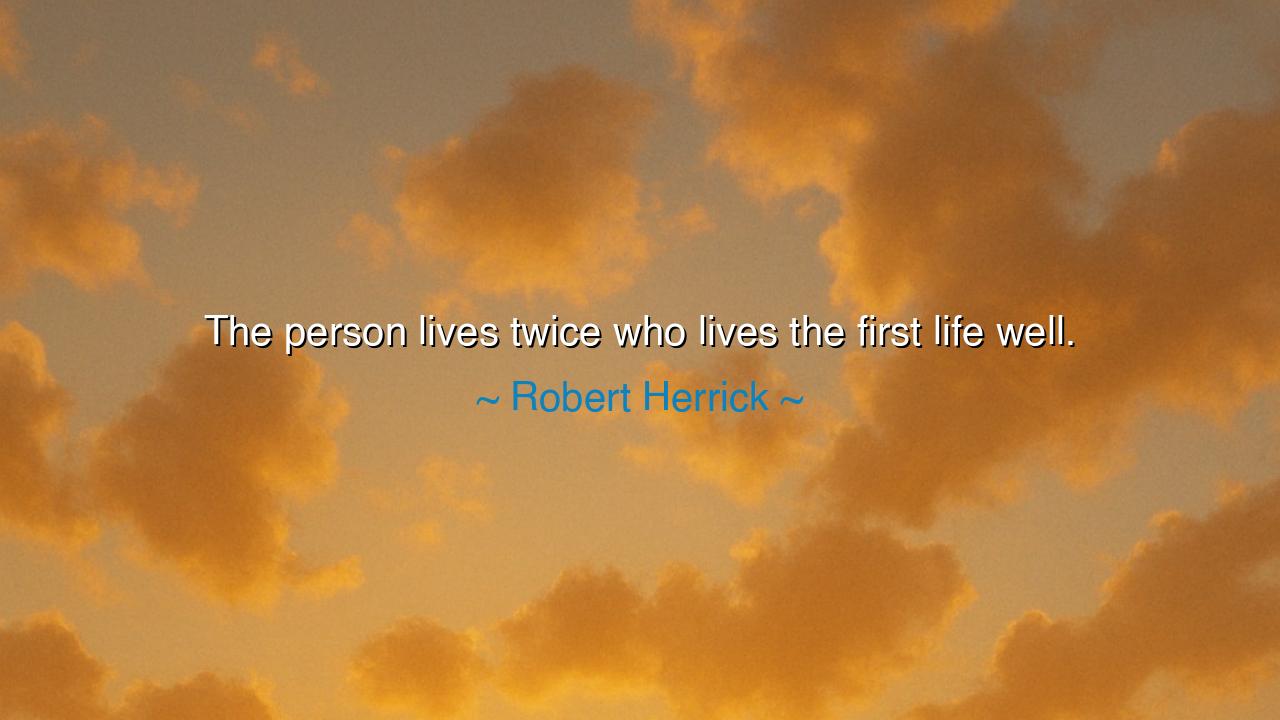
The person lives twice who lives the first life well.






“The person lives twice who lives the first life well.” – Robert Herrick
In this shining fragment of wisdom, Robert Herrick, the poet of both joy and mortality, offers a truth as timeless as breath itself. His words remind us that to live well — not merely to exist, not merely to endure — is to achieve a kind of immortality. The one who fills their first life with meaning, courage, and love has already lived a second, for their spirit echoes beyond their years. In the language of the ancients, this is the victory over death — not through conquest or wealth, but through the art of living fully. Herrick, writing in the 17th century, lived among plagues, wars, and the fleeting beauty of the English countryside. Surrounded by impermanence, he learned that the only way to conquer time was to live in such a way that one’s memory, one’s influence, and one’s peace endure after the body has gone.
Herrick’s phrase belongs to the same tradition as his most famous counsel — “Gather ye rosebuds while ye may.” He believed in the holiness of the present moment, in the sacred duty to live with intensity and virtue, so that when death arrives, it finds no regret. To him, the person who truly lives once — who tastes life in its fullness, who honors love, friendship, art, and goodness — has already lived twice. For such a person continues to dwell in the hearts of others, in the fragrance of their deeds, in the quiet glow of their example. Their first life becomes their second, not through reincarnation, but through remembrance and legacy.
The ancients knew this truth long before Herrick. The Greek philosophers spoke of arete — the excellence of character that grants immortality of soul. The Stoics, like Marcus Aurelius, taught that one must live as if every day were both the first and the last, so that the story of life may end without sorrow. Herrick’s wisdom joins this lineage: he teaches that a life well-lived is not measured in years, but in depth. To waste one’s days in fear, envy, or vanity is to die many times before death. But to live bravely, with gratitude and purpose, is to live twice — once in time, and once in eternity.
Consider the example of Leonardo da Vinci, who lived with a relentless curiosity that transcended centuries. His first life, lived in devotion to beauty and knowledge, continues to breathe in the paintings and inventions he left behind. Though his heart ceased beating five hundred years ago, his vision still speaks — he lives again every time someone marvels at the mystery of the Mona Lisa, or dreams of flight as he once did. Leonardo’s secret, as Herrick would say, was not in living long, but in living completely. Each moment was a seed of eternity, and from such seeds, immortality blooms.
But one need not be a genius to live twice. The same truth shines in the life of the humble and the kind — in the teacher whose words outlive her, in the parent whose love shapes generations, in the friend whose loyalty becomes legend. Every act of goodness, every deed done with integrity, becomes a spark carried forward by others. The one who lives the first life well leaves traces of light in every soul they touch. And when they are gone, those traces become the second life — a living memory woven into the fabric of the world.
Herrick’s wisdom also carries a quiet warning. For he reminds us that many move through life half-asleep — their days consumed by distraction, their hearts dulled by the weight of fear or regret. To such as these, life passes unnoticed, and death arrives uninvited. To live well, then, is an act of awakening. It means to be present to the miracle of breath, to the beauty of love, to the fleeting joy of existence. It means to live in such a way that your life, when recalled, becomes a source of strength to others — a light that does not dim.
The lesson is this: do not wait for the second life to begin; live the first so deeply that it never truly ends. Let each day be lived with purpose, so that your time becomes eternal through the goodness you give. Speak truth. Create beauty. Forgive quickly and love without hesitation. Leave behind no bitterness, only blessings. In this way, you will not merely survive — you will endure.
So, remember the voice of Robert Herrick: “The person lives twice who lives the first life well.” Do not measure your years by the ticking of the clock, but by the radiance of your deeds. Let your first life be a masterpiece — painted with courage, kindness, and wonder — and your second life will arise naturally, not in body, but in spirit, echoing through time like a song that never ends. For the one who lives well has already conquered death, and needs no resurrection, for they have never truly ceased to live.






AAdministratorAdministrator
Welcome, honored guests. Please leave a comment, we will respond soon